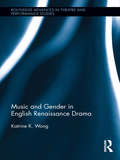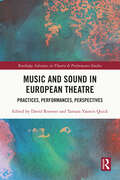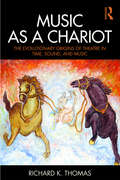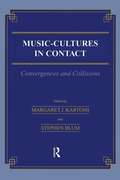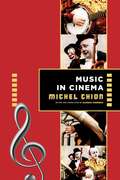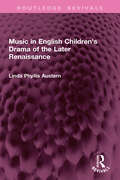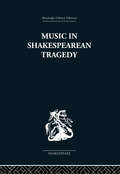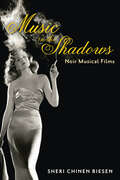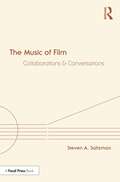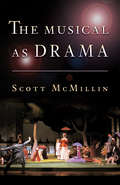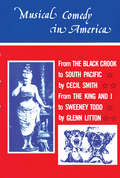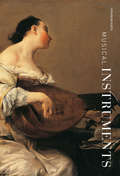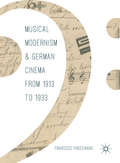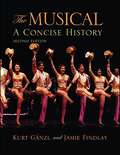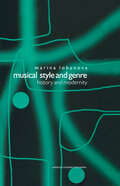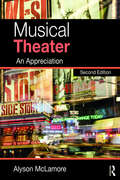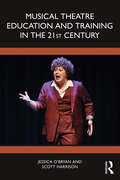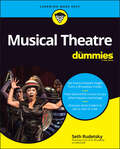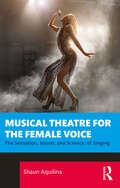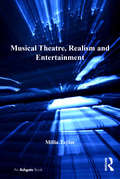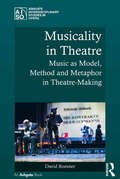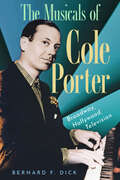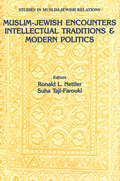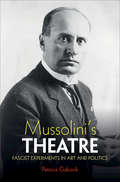- Table View
- List View
Music and Gender in English Renaissance Drama (Routledge Advances in Theatre & Performance Studies)
by Katrine K. WongThis book offers a survey of how female and male characters in English Renaissance theatre participated and interacted in musical activities, both inside and outside the contemporary societal decorum. Wong’s analysis broadens our understanding of the general theatrical representation of music, or musical dramaturgy, and complicates the current discussion of musical portrayal and construction of gender during this period. Wong discusses dramaturgical meanings of music and its association with gender, love, and erotomania in Renaissance plays. The negotiation between the dichotomous qualities of the heavenly and the demonic finds extensive application in recent studies of music in early modern English plays. However, while ideological dualities identified in music in traditional Renaissance thinking may seem unequivocal, various musical representations of characters and situations in early modern drama would prove otherwise. Wong, building upon the conventional model of binarism, explores how playwrights created their musical characters and scenarios according to the received cultural use and perception of music, and, at the same time, experimented with the multivalent meanings and significance embodied in theatrical music.
Music and Sound in European Theatre: Practices, Performances, Perspectives (Routledge Advances in Theatre & Performance Studies)
by David Roesner Tamara Yasmin QuickThe need for a research volume on European theatre music and sound is almost self-evident.Musical and sonic practices have been an integral part of theatre ever since the artform was first established 2,500 years ago: not just in subsequent genres that are explicitly driven by music, such as opera, operetta, ballet, or musical theatre, but in all kinds of theatrical forms and conventions. Conversely, academic recognition of the role of theatre music, its aesthetics, creative processes, authorships, traditions, and innovations is still insufficient. This volume unites experts from different disciplines and backgrounds to make a significant contribution to the much-needed discourse on theatre music. The term itself is a shapeshifter that signifies different phenomena at different times: the book thus deliberately casts a wide net to explore both the highly contextual terminologies and the many ways in which different times and cultures understand ‘theatre music’. By treating theatre music as a practice, focusing on its role in creating and watching performances, the book appeals to a wide range of readerships: researchers and students of all levels, journalists, audiences, and practitioners.It will be useful to universities and conservatoires alike and relevant for many disciplines in the humanities.
Music as a Chariot: The Evolutionary Origins of Theatre in Time, Sound, and Music
by Richard K. ThomasMusic as a Chariot offers a multidisciplinary perspective whose primary proposition is that theatre is a type of music. Understanding how music enables the theatre experience helps to shape our entire approach to the performing arts. Beginning with a discussion on the origin and nature of time, the author takes us on an evolutionary journey to discover how music, language and mimesis co-evolved, eventually coming together to produce the complex way we experience theatre. The book integrates the evolutionary neuroscience of the human brain into this journey, offering practical implications and applications for the auditory expression of this concept—namely the fundamental techniques artists use to create sound scores for theatre. With contributions from directors, playwrights, actors and designers, Music as a Chariot explores the use of music to carry ideas into the human soul—a concept that extends beyond the theatrical to include film, video gaming, dance, or anywhere art is manipulated in time.
Music \= Cultures in Contact: Convergences and Collisions (Musicology #16)
by Margaret J. Kartomi Stephen BlumFirst Published in 1995. Routledge is an imprint of Taylor & Francis, an informa company.
Music in Cinema (Film and Culture Series)
by Michel ChionMichel Chion is renowned for his explorations of the significance of frequently overlooked elements of cinema, particularly the role of sound. In this inventive and inviting book, Chion considers how cinema has deployed music. He shows how music and film not only complement but also transform each other.The first section of the book examines film music in historical perspective, and the second section addresses the theoretical implications of the crossover between art forms. Chion discusses a vast variety of films across eras, genres, and continents, embracing all the different genres of music that filmmakers have used to tell their stories. Beginning with live accompaniment of silent films in early movie houses, the book analyzes Al Jolson’s performance in The Jazz Singer, the zither in The Third Man, Godard’s patchwork sound editing, the synthesizer welcoming the flying saucer in Close Encounters of the Third Kind, and the Kinshasa orchestra in Felicité, among many more. Chion considers both original scores and incorporation of preexisting works, including the use and reuse of particular composers across cinematic traditions, the introduction of popular music such as jazz and rock, and directors’ attraction to atonal and dissonant music as well as musique concrète, of which he is a composer.Wide-ranging and original, Music in Cinema offers a welcoming overview for students and general readers as well as refreshingly new and valuable perspectives for film scholars.
Music in English Children's Drama of the Later Renaissance (Routledge Revivals)
by Linda Phyllis AusternOriginally published in 1992, Music in English Children’s Drama of the Later Renaissance is the first book-length study to examine the Elizabethan and Jacobean children’s drama, not only from a musicological perspective, but also drawing on the histories of literature, culture, and the theater. It gives the children’s companies new historical significance, showing that they were an integral and ultimately influential part of the London theatrical world. These companies originated important features of later drama, such as music before and between acts, and the exploitation of different timbres for specific effects.Those interested in music history, English literature, theater history, and cultural history will find this a comprehensive and fascinating study. Of special note are the appendices, which offer a unique and important reference source by providing the only definitive list of the plays and songs used by the children.
Music in Shakespearean Tragedy
by F W SternfeldFirst published in 1963. When originally published this book was the first to treat at full length the contribution which music makes to Shakespeare's great tragedies, among them Hamlet, Othello, and King Lear. Here the playwright's practices are studied in conjunction with those of his contemporaries: Marlowe and Jonson, Marston and Chapman. From these comparative assessments there emerges the method that is peculiar to Shakespeare: the employment of song and instrumental music to a degree hitherto unknown, and their use as an integral part of the dramatic structure.
Music in the Shadows: Noir Musical Films
by Sheri Chinen BiesenSome musical films use film noir style and jazz to reveal the dark side of fame and the American Dream.Smoke. Shadows. Moody strains of jazz. Welcome to the world of "noir musical" films, where tormented antiheroes and hard-boiled musicians battle obsession and struggle with their music and ill-fated love triangles. Sultry divas dance and sing the blues in shrouded nightclubs. Romantic intrigue clashes with backstage careers. In her pioneering study, Music in the Shadows, film noir expert Sheri Chinen Biesen explores musical films that use film noir style and bluesy strains of jazz to inhabit a disturbing underworld and reveal the dark side of fame and the American Dream. While noir musical films like A Star Is Born include musical performances, their bleak tone and expressionistic aesthetic more closely resemble the visual style of film noir. Their narratives unfold behind a stark noir lens: distorted, erratic angles and imbalanced hand-held shots allow the audience to experience a tortured, disillusioned perspective.While many musicals glamorize the quest for the spotlight in Hollywood's star factory, brooding noir musical films such as Blues in the Night, Gilda, The Red Shoes, West Side Story, and Round Midnight stretch the boundaries of film noir and the musical as film genres collide. Deep shadows, dim lighting, and visual composition evoke moodiness, cynicism, pessimism, and subjective psychological points of view.As in her earlier study of film noir, Blackout: World War II and the Origins of Film Noir, Biesen draws on extensive primary research in studio archives to situate her examination within a historical, industrial, and cultural context.
The Music of Film: Collaborations and Conversations
by Steven A. SaltzmanThe Music of Film opens up the world of film music from the inside. Through a series of interviews and conversations with professional composers, music supervisors, music editors, and picture editors, this book shows how music for film and television works according to insiders in the industry. Here we find a comprehensive collection of techniques and personal insights and get a unique perspective on how these key players in postproduction interact, collaborate, and successfully build their careers. The Music of Film is essential reading for composers, editors, directors, and producers—aspiring and established alike—or anyone interested in learning how to start or manage a profession working with music in feature films, television, and other media.
The Musical as Drama
by H. Scott McMillinDerived from the colorful traditions of vaudeville, burlesque, revue, and operetta, the musical has blossomed into America's most popular form of theater. Scott McMillin has developed a fresh aesthetic theory of this underrated art form, exploring the musical as a type of drama deserving the kind of critical and theoretical regard given to Chekhov or opera. Until recently, the musical has been considered either an "integrated" form of theater or an inferior sibling of opera. McMillin demonstrates that neither of these views is accurate, and that the musical holds true to the disjunctive and irreverent forms of popular entertainment from which it arose a century ago. Critics and composers have long held the musical to the standards applied to opera, asserting that each piece should work together to create a seamless drama. But McMillin argues that the musical is a different form of theater, requiring the suspension of the plot for song. The musical's success lies not in the smoothness of unity, but in the crackle of difference. While disparate, the dancing, music, dialogue, and songs combine to explore different aspects of the action and the characters. Discussing composers and writers such as Rodgers and Hammerstein, Stephen Sondheim, Kander and Ebb, Leonard Bernstein, and Jerome Kern, The Musical as Drama describes the continuity of this distinctively American dramatic genre, from the shows of the 1920s and 1930s to the musicals of today.
Musical Comedy in America: From The Black Crook to South Pacific, From The King & I to Sweeney Todd
by Cecil A. Smith Glenn LittonFirst Published in 1987. Routledge is an imprint of Taylor & Francis, an informa company.
Musical Instruments
by Darcy KuronenEnhanced with twenty-five audio and twenty-three video clips of expert musicians performing on rare and historical instruments, this e-book edition of Musical Instruments brings the world-renowned collection at the Museum of Fine Arts, Boston, to life. Musical instruments are among the most meaningful artifacts produced by humankind, a marriage of technology, artistry, symbolism, religion, and entertainment. This title in the MFA Highlights series presents more than a hundred examples, spanning a breadth of centuries and cultures, to invite readers to experience a brilliant array of instruments as producers of both aural and visual delight. The pieces included here - which range from an ancient Greek trumpet to a modern lap steel guitar, and from earthenware panpipes to the complex Indonesian gamelan - are remarkable not only for the myriad sounds they produce, but also for their varied and often extraordinarily beautiful appearance. Musical Instruments offers a vivid encounter with a rich collection, enhanced to provide an accessible and fascinating introduction to the artistry and significance of musical instruments around the world.ABOUT THE AUTHORDarcy Kuronen is Department Head and Pappalardo Curator of Musical Instruments at the Museum of Fine Arts, Boston.
Musical Instruments
by Darcy KuronenEnhanced with twenty-five audio and twenty-three video clips of expert musicians performing on rare and historical instruments, this e-book edition of Musical Instruments brings the world-renowned collection at the Museum of Fine Arts, Boston, to life. Musical instruments are among the most meaningful artifacts produced by humankind, a marriage of technology, artistry, symbolism, religion, and entertainment. This title in the MFA Highlights series presents more than a hundred examples, spanning a breadth of centuries and cultures, to invite readers to experience a brilliant array of instruments as producers of both aural and visual delight. The pieces included here - which range from an ancient Greek trumpet to a modern lap steel guitar, and from earthenware panpipes to the complex Indonesian gamelan - are remarkable not only for the myriad sounds they produce, but also for their varied and often extraordinarily beautiful appearance. Musical Instruments offers a vivid encounter with a rich collection, enhanced to provide an accessible and fascinating introduction to the artistry and significance of musical instruments around the world.ABOUT THE AUTHORDarcy Kuronen is Department Head and Pappalardo Curator of Musical Instruments at the Museum of Fine Arts, Boston.
Musical Modernism and German Cinema from 1913 to 1933
by Francesco FinocchiaroThis book investigates the relationship between musical Modernism and German cinema. It paves the way for anunorthodox path of research, one which has been little explored up until now. The main figures of musical Modernism, from Alban Berg to Paul Hindemith, and from Richard Strauss to Kurt Weill, actually had a significant relationship with cinema. True, it was a complex and contradictory relationship in which cinema often emerged more as an aesthetic point of reference than an objective reality; nonetheless, the reception of the language and aesthetic of cinema had significant influence on the domain of music. Between 1913 and 1933, Modernist composers' exploration of cinema reached such a degree of pervasiveness and consistency as to become a true aesthetic paradigm, a paradigm that sat at the very heart of the Modernist project. In this insightful volume, Finocchiaro shows that the creative confrontation with the avant-garde medium par excellence can be regarded as a vector of musical Modernism: a new aesthetic paradigm for the very process - of deliberate misinterpretation, creative revisionism, and sometimes even intentional subversion of the Classic-Romantic tradition - which realized the "dream of Otherness" of the Modernist generation.
The Musical, Second Edition: A Concise History
by Kurt Gänzl Jamie FindlayThe Musical, Second Edition, introduces students and general readers to the entire scope of the history of musical theater, from eighteenth-century ballad operas to nineteenth-century operettas, to the Golden Age of Broadway to today. In this comprehensive history, master theater historian Kurt Gänzl draws on his vast knowledge of the productions, the actors, the music and dance, and the reception of the central repertory of the musical theater. Focus boxes on key shows are included in every chapter, along with a chronology of the major musical productions described in the text. Production photographs from around the world enhance the descriptions of the costumes and staging. This book is an ideal introduction for college-level courses on the History of Musical Theater and will also appeal to the general theatergoer who wants to learn more about how today’s musical developed from its earliest roots.
Musical Style and Genre: History and Modernity
by Marina LobanovaFirst published in 2000. Routledge is an imprint of Taylor & Francis, an informa company.
Musical Theater: An Appreciation (2nd Edition)
by Alyson McLamore<p>Musical Theater: An Appreciation, Second Edition offers a history of musical theater from its operating origins to the Broadway shows of today, combined with an in-depth study of the musical styles that paralleled changes on stage. Alyson McLamore teaches readers how to listen to both the words and the music of the stage musical, enabling them to understand how all the components of a show interact to create a compelling experience for audiences. <p>This second edition has been updated with new chapters covering recent developments in the twenty-first century, while insights from recent scholarship on musical theater have been incorporated throughout the text. The musical examples discussed in the text now include detailed listening guides, while a new companion website includes plot summaries and links to audio of the musical examples. <p>From Don Giovanni to Hamilton, Musical Theater: An Appreciation both explores the history of musical theater and develops a deep appreciation of the musical elements at the heart of this unique art form.</p>
Musical Theatre Education and Training in the 21st Century
by Scott D. Harrison Jessica O'BryanMusical Theatre Education and Training in the 21st Century presents a wide range of viewpoints on the musical theatre profession. It brings together research from the UK, US, Australia, and beyond, providing an essential resource for educators, students, and all those involved in training for musical theatre. The research draws on best practice from creatives, producers, practising artists, and the academy to reveal a multiplicity of approaches and educational pathways for consideration by performers, educators, institutions, and the profession.The book goes beyond the key elements of performance training in singing, dancing, and acting to explore adjacent creative and business skills, along with some of the more recent and challenging aspects of the profession such as diversity of representation both on and off stage, building safe working environments, and managing mental and physical health and wellbeing. The authors incorporate information from over 100 interviews with everyone from emerging performers to leading professionals, and explore the practicalities of pre-professional training, skills development, and curricular design, alongside the broader attributes required in preparation for the profession. This book offers vital insights into how musical theatre practitioners can best be prepared to make their way in the field now and in the future.
Musical Theatre For Dummies
by Seth RudetskyDiscover what goes on behind the curtains of your favorite musical Have you ever dreamed of being in a Broadway musical, or even just to be in the ensemble in your local community theatre? In Musical Theater For Dummies, Broadway insider and host of Sirus/XM Radio’s ON BROADWAY channel Seth Rudetsky takes you backstage and shows you what it takes to create a spectacular production. You’ll get the behind-the-curtain view of how your favorite on- and off-Broadway shows are made, plus get expert advice on how to launch your own career under the bright lights. If you’re new to musical theater, this book will initiate you into the world of musicals by sharing the stories and lingo that defines this fascinating world. This unique book shares insights into what makes musical theatre tick and how you can enjoy a show from your seat in the audience or from the stage itself. Learn the history of musical theater and discover the shows born on Broadway or the West End that became cultural phenomena Trace the development of productions, from the idea stage all the way through opening night and beyond Enjoy theater productions more, thanks to deep insights into how theater is made Get insider advice on the skills you need to perform in professional or amateur musical theater productions Real-life anecdotes and excellent show recommendations will entertain and delight you as you become a musical theater know-it-all, with Dummies.
Musical Theatre for the Female Voice: The Sensation, Sound, and Science, of Singing
by Shaun AquilinaFemale musical theatre singers produce some of the most exciting and expressive singing an audience can experience. They also face a unique and specific set of issues when approaching their craft, from negotiating the registers of their voice to enable them to belt, to vocal health challenges such as premenstrual voice syndrome. This is the only book that offers a full and detailed guide to tackling those issues and to singing with full expression and technical excellence. Musical Theatre for the Female Voice covers the origin of singing in musicals, from the bel canto style of 300 years ago through to the latest developments in high belting, in shows such as Wicked and Waitress. It offers the reader exercises and methods that have been used to train hundreds of singers at some of the UK’s leading musical theatre training institutions and are underpinned by the latest academic research in journals on singing, psychology, and health. Every element of a singer's toolkit is covered from a female perspective, from breath and posture to character work and vocal health. This is an essential guidebook for female singers in musical theatre productions, either training at university or conservatory level or forging a career as professional triple-threat performers.
Musical Theatre, Realism and Entertainment (Ashgate Interdisciplinary Studies in Opera)
by Millie TaylorWhat is it about musical theatre that audiences find entertaining? What are the features that lead to its ability to stimulate emotional attachment, to move and to give pleasure? Beginning from the passion musical theatre performances arouse and their ubiquity in London's West End and on Broadway this book explores the ways in which musical theatre reaches out to and involves its audiences. It investigates how pleasure is stimulated by vocal, musical and spectacular performances. Early discussions centre on the construction of the composed text, but then attention is given to performance and audience response. Musical theatre contains disruptions and dissonances in its multiple texts, it allows gaps for audiences to read playfully. This combines with the voluptuous sensations of embodied emotion, contagiously and viscerally shared between audience and stage, and augmented through the presence of voice and music. A number of features are discovered in the construction of musical theatre performance texts that allow them to engage the intense emotional attachment of their audiences and so achieve enormous popularity. In doing this, the book challenges the conception of musical theatre as 'only entertainment'. Entertainment instead becomes a desirable, ephemeral and playful concept.
Musicality in Theatre: Music as Model, Method and Metaphor in Theatre-Making (Ashgate Interdisciplinary Studies in Opera)
by David RoesnerAs the complicated relationship between music and theatre has evolved and changed in the modern and postmodern periods, music has continued to be immensely influential in key developments of theatrical practices. In this study of musicality in the theatre, David Roesner offers a revised view of the nature of the relationship. The new perspective results from two shifts in focus: on the one hand, Roesner concentrates in particular on theatre-making - that is the creation processes of theatre - and on the other, he traces a notion of ‘musicality’ in the historical and contemporary discourses as driver of theatrical innovation and aesthetic dispositif, focusing on musical qualities, metaphors and principles derived from a wide range of genres. Roesner looks in particular at the ways in which those who attempted to experiment with, advance or even revolutionize theatre often sought to use and integrate a sense of musicality in training and directing processes and in performances. His study reveals both the continuous changes in the understanding of music as model, method and metaphor for the theatre and how different notions of music had a vital impact on theatrical innovation in the past 150 years. Musicality thus becomes a complementary concept to theatricality, helping to highlight what is germane to an art form as well as to explain its traction in other art forms and areas of life. The theoretical scope of the book is developed from a wide range of case studies, some of which are re-readings of the classics of theatre history (Appia, Meyerhold, Artaud, Beckett), while others introduce or rediscover less-discussed practitioners such as Joe Chaikin, Thomas Bernhard, Elfriede Jelinek, Michael Thalheimer and Karin Beier.
The Musicals of Cole Porter: Broadway, Hollywood, Television
by Bernard F. DickCole Porter (1891–1964) remains one of America’s most popular composer-songwriters, known for the many urbane, witty, romantic songs he wrote for stage musicals and Hollywood films. Porter was unique among his contemporaries for writing both the music and lyrics for his compositions. To this day, several of his numbers—“Night and Day,” “I’ve Got You Under My Skin,” “You’re the Top,” and “I Get a Kick Out of You,” to name a few—endure as standards. In The Musicals of Cole Porter: Broadway, Hollywood, Television, Bernard F. Dick presents a critical study of Porter’s Broadway and movie musicals, and his one foray into live television, Aladdin—covering the period from his first failure, See America First (1916), to the moderately successful Silk Stockings (1955), which ended his Broadway career. Taking a chronological approach, interspersed with chapters on Porter’s “list songs” that owe much to such operas as Mozart’s Don Giovanni and Rossini’s The Barber of Seville; his love songs, often bittersweet and bleakly poignant; and, above all, his love of figurative language, Dick discusses in detail the various literary sources and cultural reference points that inspired the lyrics to Porter’s numbers. The first volume of its kind exclusively dedicated to exploring the extensive body of work by this influential twentieth-century songwriter, The Musicals of Cole Porter is a compelling resource for readers interested in the craft of a great composer-lyricist.
Muslim-Jewish Encounters (Studies In Muslim-jewish Relations Ser. #Vol. 4.)
by NettlerFirst Published in 1998. Routledge is an imprint of Taylor & Francis, an informa company.
Mussolini's Theatre: Fascist Experiments in Art and Politics
by Patricia GaborikBenito Mussolini has persistently been described as an 'actor' – and also as a master of illusions. In her vividly narrated account of the Italian dictator's relationship with the theatre, Patricia Gaborik discards any metaphorical notions of Il Duce as a performer and instead tells the story of his life as literal spectator, critic, impresario, dramatist and censor of the stage. Discussing the ways in which the autarch's personal tastes and convictions shaped, in fascist Italy, theatrical programming, she explores Mussolini's most significant dramatic influences, his association with important figures such as Luigi Pirandello, Gabriele D'Annunzio and George Bernard Shaw, his oversight of stage censorship, and his forays into playwriting. By focusing on its subject's manoeuvres in the theatre, and manipulation of theatrical ideas, this consistently illuminating book transforms our understandings of fascism as a whole. It will have strong appeal to readers in both theatre studies and modern Italian history.
